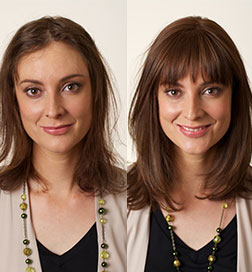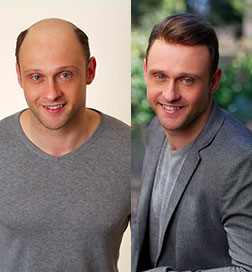Grief is a very normal process experienced by people going through major losses of many kinds. The process is complex, and doesn't look the same for everyone. Many descriptions of gried will suggest that the process has a straight progression with a clear beginning and end, and set stages in the middle. However, the process is not always linear. Grief has an impact on individuals, friends and family – this impact can be emotional, psychological and even physical. Read below to find out about some of the common phases that some individuals go through as they grieve.
Grief doesn't always involve the death of a loved one. Any big changes in your life can trigger feelings of denial, anger, bargaining, depression and accepance. If you are experiencing hair loss, it is very possible that you will feel one or a combination of these emotions. It is likely that you will grieve the past, before your hair loss began. You may feel:
Denial– “I feel totally fine.' or “This can't be happening to me.' Denial is generally a temporary defense against the initial shock of going through a problem. When you first experience lost or thinning hair, you might find it hard to accept that it is happening. You may try very hard to convince yourself and others that you aren't losing your hair.
Anger– “But this just isn't fair' or “How can this happen to me?' or ''Who can I blame for this?' Anger is a strong emotional response that sometimes follows denial. Once you've realised that hair loss is a reality for you, it is common that you become angry about this fact. Why is it that you have to go through this problem when other people don't?
Bargaining- “What can I do to make this go away?' or “I will give anything if…' This phase is usually about the individual trying to find some way to get out of the trouble/problem. In the case of hair loss, usually this involves bargaining with a higher power in exchange for the old head of hair.
Depression- “This is so horrible, why keep going?' or “What's the point?' During the depression stage, individuals begin to more fully understand and feel the negative effects of hair loss. This can be really difficult, and lead to withdrawal and isolation. It is very normal to feel sadness and fearfulness in the depression stage.
Acceptance- “It will all be ok.' or “I can't stop this from being a reality, so what can I do about it?' The acceptance stage involves the eventual accepting of the reality of hair loss, and preparation for that reality. Along with this stage, the individual might educate their loved ones about their hair loss, and find solutions for the problem. However, reaching acceptance may not happen overnight. Grief is a process that means something different for everyone.
Don't discount your emotions about hair loss. Allow yourself to grieve and reach out to others for support. It is helpful to remember that others have experienced the struggle of hair loss as well – you are not alone. If you want professional support as you work through this difficult time in life, contact a counselor or support group for guidance. Often, sharing your emotions with others who understand what you are going through is a powerful first step.
Related: Alopecia Areata Story – What It Feels like to Lose Your Hair
You aren't powerless in your experience of hair loss. To explore a variety of hair loss solutions, contact us on 1300 427 778. To find out which solution best suits your needs, book your free and confidential consultation here – with no obligation to purchase.




